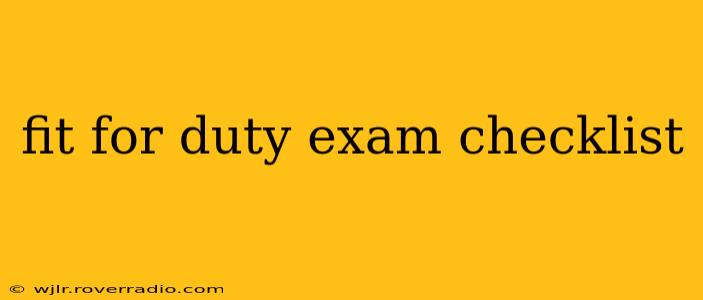A "fit for duty" exam, also known as a fitness for work examination, ensures employees are physically and mentally capable of performing their job safely and effectively. This checklist covers key aspects for both employers and employees navigating this crucial process. This guide aims to clarify the process, address common concerns, and ensure a smooth and legally compliant procedure.
What is a Fit for Duty Exam?
A fit for duty exam is a medical assessment designed to determine if an employee is capable of performing their job responsibilities without posing a risk to themselves or others. The specific requirements vary widely based on the profession, the nature of the job, and relevant legal regulations (such as OSHA guidelines in the US). Some jobs, like those involving heavy machinery operation or patient care, have stricter requirements than others. These exams might involve physical examinations, psychological evaluations, or drug testing, depending on the context.
Who Needs a Fit for Duty Exam?
Several situations may necessitate a fit for duty exam:
- Post-injury return to work: After an injury or illness, an employee might need a clearance from a physician to return to work.
- Pre-employment screening: Some employers require pre-employment medical checks to ensure candidates meet the physical and mental demands of the job.
- Random or suspicion-based testing: Certain industries, such as transportation or aviation, may conduct random or suspicion-based drug and alcohol testing.
- Periodic health assessments: For roles requiring sustained physical or mental alertness, periodic fitness assessments might be mandatory.
- Changes in job duties: If an employee's responsibilities change significantly, a reassessment of their fitness for the new role may be required.
What to Expect During a Fit for Duty Exam: A Checklist for Employees
This checklist is not exhaustive and may not apply to all situations. The specific requirements will be dictated by the employer and relevant regulations.
Before the Exam:
- Review the employer's policy: Familiarize yourself with the company's policies regarding fit for duty exams.
- Inform your physician: Discuss your medical history with your doctor and any concerns you might have.
- Gather relevant medical records: Bring any relevant medical records, including previous doctor's notes, test results, and medication lists.
- Prepare questions: Write down questions you have about the exam process or the results.
During the Exam:
- Be honest and forthcoming: Provide accurate information about your health history and current condition.
- Follow instructions: Adhere to any instructions given by the medical professional conducting the exam.
- Ask clarifying questions: Don't hesitate to ask questions if you don't understand something.
- Document everything: Make note of the date, time, and any key details discussed during the exam.
After the Exam:
- Follow up with your physician: Ask your doctor to explain the results clearly and answer any further questions.
- Understand the implications: Discuss the implications of the exam's findings with your employer.
- Appeal if necessary: If you believe the assessment was unfair or inaccurate, explore your options for appealing the decision (following your company’s policy and any relevant legal avenues).
What to Expect During a Fit for Duty Exam: A Checklist for Employers
This checklist emphasizes legal compliance and ethical considerations.
Before the Exam:
- Develop a clear policy: Establish a detailed and comprehensive policy outlining the procedure for conducting fit for duty exams. Ensure it complies with all relevant legal regulations (e.g., ADA compliance in the US).
- Select qualified medical professionals: Choose physicians or healthcare providers with expertise in occupational health and safety.
- Ensure confidentiality: Implement strict confidentiality protocols to protect employee medical information.
- Provide clear communication: Clearly communicate the exam's purpose, process, and expectations to employees.
During the Exam:
- Maintain impartiality: Ensure the medical professional conducting the exam remains impartial and objective.
- Document everything: Maintain comprehensive records of the exam process, results, and any follow-up actions.
- Respect employee rights: Be mindful of employee rights and privacy regulations.
After the Exam:
- Review results with employee: Carefully review the results with the employee, explaining the findings and their implications.
- Accommodate where possible: If an employee is found to have limitations, explore options for reasonable accommodations to allow them to continue working safely.
- Address any potential safety concerns: If the employee's condition poses a safety risk, take appropriate steps to mitigate those risks.
What if I Disagree with the Fit for Duty Exam Results?
This is a crucial aspect. Both employers and employees should understand their rights and the appeals process. Disagreements require careful handling, often involving consultation with legal counsel to ensure compliance with regulations. Open communication and a fair appeals process are essential to maintain a positive employer-employee relationship.
Conclusion
Navigating fit for duty exams requires a careful understanding of legal guidelines, ethical considerations, and the specific requirements of individual job roles. This comprehensive checklist serves as a valuable resource for both employers and employees to ensure a smooth and compliant process, prioritizing the health and safety of everyone involved. Remember to consult with legal and medical professionals to ensure you're following all applicable regulations.
